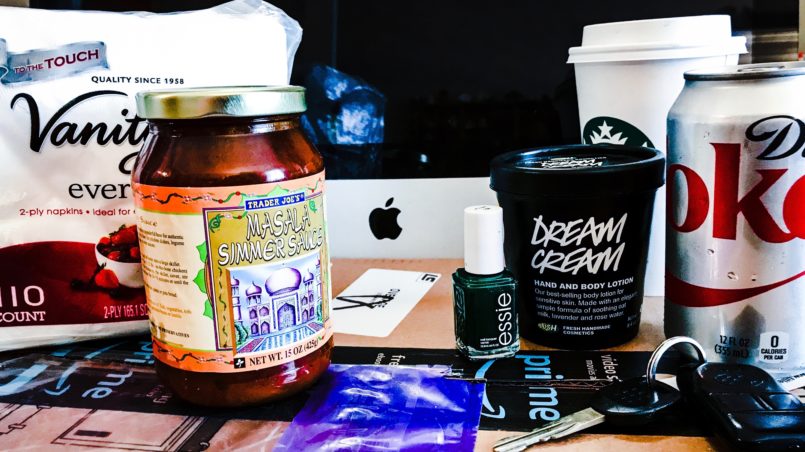With Brand Trump hawking everything from shoes to hotels on the back steps of the White House, the line between consumerism and politics has almost completely disappeared. Money and politics isn’t a new song. The Koch Brothers have been funding the Tea Party for years. Chik-fil-A and Hobby Lobby have done their part in leading the anti-LGBT chorus all the way to the Supreme Court. On the left, we’ve certainly taken more than one spin on the dance floor. But liberals have been slower to embrace our own daily consumerism as a political instrument.
More often, the left has withheld its purchasing power in the form of boycotts, with varying levels of success. The Montgomery Bus Boycott in the ’50s and the Grape Boycott in the ’70s are shining moments of political activism, but both cases were more than consumer actions. Recently, there’s been #GrabYourWallet and #DeleteUber, but Ivanka’s sales are up, and too many of us mutter, “I need to install the Lyft app,” as we’re clicking Uber.
Many economists are doubtful boycotts work in the long term. Various Christian groups have been boycotting Disney for years with little effect. At best, boycotts are effective as part of a larger, organized, strategic campaign that involves legal and political actions. Yes, there’s the argument that, in the days of social media, things could change. Getting the word out about corporate misdeeds is certainly easier and faster. But let’s be honest. Even though I’ve received countless emails with the list of Koch Brother companies, I still buy Vanity Fair napkins at Costco. After 35 minutes pushing an increasingly heavy cart, all I want to do is get through the checkout line with my giant bag of walnuts and family pack of organic chickens. So I grab the napkin brand I’ve bought for years.
I needed a plan.
And not just a plan to avoid companies that support politics that I object to, like the Koch Brothers’. A plan that would help me target companies that support my progressive values. The right has been far more effective than the left at aligning themselves with corporations to promote and fund their values. Walmart, the largest employer in the U.S., may be the equivalent to the Evil Empire on my social media feeds, but the company has earned a lot of goodwill on the right by supporting open carry laws and union busting as well as distributing fresh water to flood victims.
On the left, we need to do a better job of supporting the companies that share our values and letting them know that their stands on social and political issues factor into our purchasing decisions.
- Personal Top 10: Figure out what corporations you are aligned with. Think about the products and companies you return to over and over, not just weekly but on an annual basis. These are the companies you’re aligned with – and have the most influence over. If you read my post Aware Consumerism: Putting Our Money Where Our Heart Is, you already know that my top ten includes Starbucks, Apple, Coke, and Amazon, but there’s also Trader Joe’s, Subaru, Lush Cosmetics, Essie Nail Polish, and of course, Vanity Fair Napkins.
- What Matters Most: Figure out what you actually care about. Pick three or four issues that will make or break your decision to continue to shop with a company. My issues pretty much line up with my voting record: Pro-choice/women, pro-LGBT rights, and pro-public schools. I care about many other issues, but these are the ones for which I’ll change my behavior. Given a choice, I’ll buy from a company that doesn’t test on animals, but it’s not an issue that will make me walk away from a company. But I will never set foot in Hobby Lobby again.
- Behind the Curtain: Unless you’re shopping exclusively at the farmer’s markets and spinning your own wool, a large percentage of the brands you purchase are owned by giant multi-national corporations. A quick internet search will usually uncover who owns what, or at least the first layer of ownership. Essie Nail Polish maker of my beloved Off Tropic Green started as an independent company but in 2010 was bought by L’Oreal, which itself is partially owned by Nestlé.
- Dump These Companies Now: There are basically three types of companies: ones that actively support your values, ones that actively oppose your values, and ones that avoid taking a stand or are somewhere in the middle. Companies in the last group you can influence, Your job is to figure out which is which.
Here are four easy ones to avoid that are actively opposing progressive values:- Koch Brothers Products: Any company owned by this ultra-conservative duo is funding their far right politics. NiftyHomestead.com has a comprehensive list of products that includes everything thing from Northern toilet paper to Lycra.
- Walmart: It’s Walmart. They’re basically evil, but in many smaller cities and towns they’re often the only option.
- Exxon: For starters, Trump’s Sectary of State, Rex Tillerman’s last job was CEO of Exxon. If that’s not enough, the company has a long history of fighting against LGBT civil rights.
- Carl’s Jr.: Donates large amounts to far right candidates and super PACs, particularly anti-choice proponents.
- And Many More: For a comprehensive list of companies that are being boycotted and why go to EthicalConsumer.org.
- Do the Research: Once you get beyond the obvious villains such as the Koch Brothers, Trump brands, Chic-fil-A choices, you’ll have to do some digging. Yes, it takes time and effort. And corporations are literally banking on the fact that you won’t do it.
- Shopping Apps: There are a number of apps that you can download to your phone and refer to as you shop. For example, if you’re worried about deforestation the Cheyenne Mountain Zoo has shopping app for products with palm oil. LGBT rights are make or break for you, you’re in luck. Human Right’s Campaign (HRC) puts out an excellent, easy-to-use buyer’s guide that you can put on your phone. L’Oreal scored an 85 out of 100 and Nestlé a 90, so at least in that department my nails get two thumbs up.
- Corporate Ratings: A variety of websites review companies. The U.K. based The Good Shopping Guide rates ethics and environmental impact of companies, including many sold on both sides of the Atlantic. L’Oreal only gets a 46 out of 100 rating, at least partly because they test on animals. For broader corporate good citizenship, Ethisphere publishes a list of its top ethical companies every year. L’Oreal made the 2016 list of 124 companies. Nestlé, however, didn’t rate.
- When There’s Not an App for That: Not every issue has a website dedicated to reviewing product and company track records. In that case, you’re going to have to get creative. I’ve yet to find a resource that tracks women issues as they relate to consumerism. But I was able to look at who’s on the board for various companies. Women hold less than 20% of the board seats of S&P 500 Companies. A quarter of companies do not have any women on the board at all. L’Oreal’s board is an impressive 46% women. And InHerSight.com crowd sources information on about how friendly to women companies are. My nails get 3.5 out of 5, not bad but not stellar.
- What PR Can Tell You: Look at the company website, particularly any philanthropic initiatives. It’s PR, and you have to read between the lines, but you can get a pretty good idea about how the company wants to be perceived and what sort of criticism they’re responsive to. L’Oreal Foundation “programs focus on identifying and supporting women through actions developed around two dynamic themes: For Women in Science and Beauty for a Better Life.”
- Rumors, Memes, and Facebook: If your information about a company isn’t coming directly from a reputable source, check it out before you pass it on or boycott. I recently posted a five-year-old boycott notice for Barilla Pasta assuming it was current. Thankfully, a friend pointed out my error, and I was able to deleted the post. Snopes covers most rumors. Lucky Charms does not contain paint thinner. Chick-fil-A does donate to anti-LGBT causes.
- Yes, No, Maybe: By this point you should have a pretty clear idea about how each of your Top 10 aligned with your values. So now the question is: What are you going to do about it?
- Find and Replace: Don’t just vow to never purchase a product again because it’s made by the devil. That’s like saying you’ll never eat another chocolate chip cookie. Figure out what you are going to purchase instead. Buy Proctor and Gamble’s Bounty and Charmin rather than Brawny and Northern Quilted, which are both Koch Brothers companies. Proctor and Gamble made the Ethisphere list and earned a 100 from HRC and 3.5 from InHerSight. Plus, a third of their board of directors are women. Bounty also makes napkins to replace my Vanity Fair paper products. It’s going to cost a little more because we won’t be able to buy in bulk, but it’s worth it.
- The Good Guys: There are bound to be a few companies out there that line up with what you believe. After a bit of research, I feel pretty darn good about my obsession with Lush Cosmetics. They’re pro-everything and support amazing charities. And Starbucks is doing a pretty good job too, but more about that in a future post.
- Stuck in the middle: Then there are those companies you’re just not sure about. Not every company you shop with has to be your knight in shining armor. Most corporations avoid politics unless it directly impacts their business, for the simple reason they don’t want to alienate consumers. Our goal needs to be to make supporting progressive values good business.
- Let Them Hear From You: Many companies are surprisingly responsive to letters from loyal customers. No, they won’t change what they’re doing overnight, but it adds up. If you choose to stop purchasing a product because of corporations policies, let them know why they’ve lost you. And just as important, if you’re switching to or staying with a company because they support your values, drop them a note to let them know. Companies rarely get letters telling them what a great job they’re doing.If you’re not sure how to go about reaching out to companies, stay tuned. I’ll be posting about who to contact and what to write. I’ve written countless complaint and compliment letters to companies, both for myself and friends, with excellent outcomes. The Ritz-Carlton even comped our honeymoon stay in Maui after one of my letters. But now, rather than telling companies about the state of their wallpaper, I’m using my super powers for the greater good, by letting companies know what I think of their politics.


